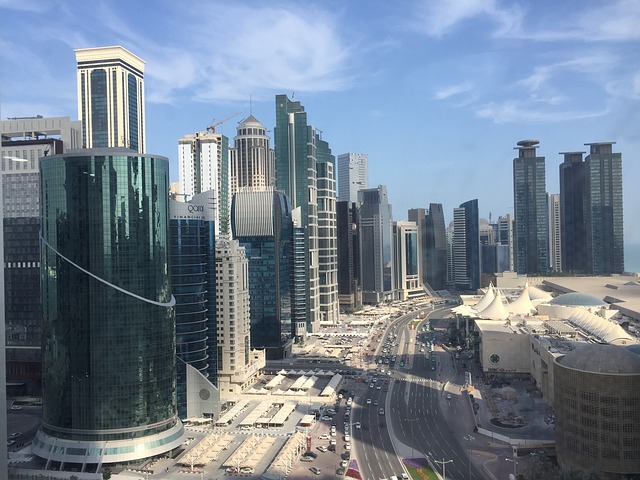
The Gulf crisis is worsening as the United Arab Emirates (UAE) now threatens to issue an economic embargo against Qatar. Despite attempts of mediation by the U.S. and Kuwait, Bahrain has also now declared that “any options” were possible as the crisis escalates.
The GCC (Gulf Cooperation Council) members are continuing tough talks with Qatar, despite combined efforts from U.S.’s president Donald Trump and Kuwaiti emir, Sheikh Sabah Al Ahmad Al Sabah, to prevent a further decline in relations.
The Gulf Crisis So Far
On Monday of this week, Gulf Nations, Bahrain, UAE, Saudi Arabia and Egypt announced that they would be immediately severing all diplomatic relations with Qatar, provoking the Gulf crisis. The action came after Qatar was accused of having sympathy for terrorist groups, including the Muslim Brotherhood, al-Qaeda, and ISIS.
The GCC members are also displeased with Qatar’s relationship with Iran. They accuse Qatar of supporting “various terrorist and sectarian groups aimed at destabilizing the region.”
The seemingly snap decision came after Qatar’s allegations in late May that hackers had taken over their state-run news agency and published “fake comments” from Qatari emir about Israel and Iran.
But this seems to have been the straw that broke the camel’s back, since Qatar has long faced criticism from its Arab neighbors about its continued support for Islamism groups, chiefly, the Sunni Islamist group, the Muslim Brotherhood.
Deeper Economic Cuts
On top of the severance of relations, air and sea embargo and withdrawal of all diplomatic personnel, UAE is now demanding further economic measures on Qatar. This will certainly escalate the Gulf crisis further, unless Doha is willing to commit to a 180-turnaround on their funding policy of armed groups. Allegations that Qatar emphatically and repeatedly deny.
Sheikh Sabah Al Ahmad Al Sabah, ruler of Kuwait, traveled to Qatar after visiting with the UAE and Saudi Arabia, in an attempt to solve the deepening Gulf crisis.
However, in what appear to be some of the harshest comments yet, Bahrain’s foreign minister, Sheikh Khalid bin Ahmed Al Khalifa, told Saudi newspaper, Mecca, that he did not believe Qatar would modify their behavior.
“We will not hesitate to protect our interests and the road is open to any options to protect ourselves from Qatar,” Sheikh Khalid reportedly said. Although, the GCC member countries maintain that these measures were not taken to force new leadership in Doha. This is more about a chance of attitude than a change of regime, the member countries maintain.
Mixed Messages From the U.S. President
Donald Trump is fast becoming infamous for his misuse of social media account, Twitter. On Tuesday, he tweeted a message that appeared to show his support for the measures taken against Qatar. Yet, on Wednesday, he telephoned Qatari Emir, as well as the UAE’s Crown Prince, Mohamed bin Zayed Al Nahyan, in attempts to ease the tensions. He even offered a meeting at the White House with Gulf officials to bring an end to the Gulf crisis.
The U.S. president is apparently emphasizing the importance of maintaining stability in the region. However, he backed this up by saying that a stable region could not be achieved while funding for terrorist activities continued.
Adel al-Jubeir, Saudi Foreign Minister, replied that the Gulf states were perfectly equipped to deal with the Gulf crisis on their own, without outside interference.
“We have not asked for mediation, we believe this issue can be dealt with among the states of the Gulf Cooperation Council,” he said at a news conference in Berlin.
What Happens Now?
al-Jubeir has so far declined to confirm a supposed list of 10 demands placed on Qatar, which include closing down Doha-based news channel, Al Jazeera. Yet al-Jubeir has stated that Qatar knows exactly what to do to resolve the Gulf crisis.
Standard & Poor downgraded Qatar’s debt on Wednesday, demonstrating the economic damage caused so far from the dispute. Qatar’s riyal also plummeted to an eleven-year low, after investors began to withdraw funding.
Qatar’s S&P long term rating has also been affected, downgraded from AA to AA- and also being placed on the CreditWatch, which means a high chance of further downgrading.
So, what happens next in the Gulf crisis? The world is holding its breath, as Qatar’s ministry of defense plays down reports that its military forces are on high alert at the country’s southern border with Saudi Arabia.
“The ministry of defense is always on alert to protect the borders of the state of Qatar,” a ministry statement said.













Facebook
Twitter
Pinterest
Google+
LinkedIn
Email